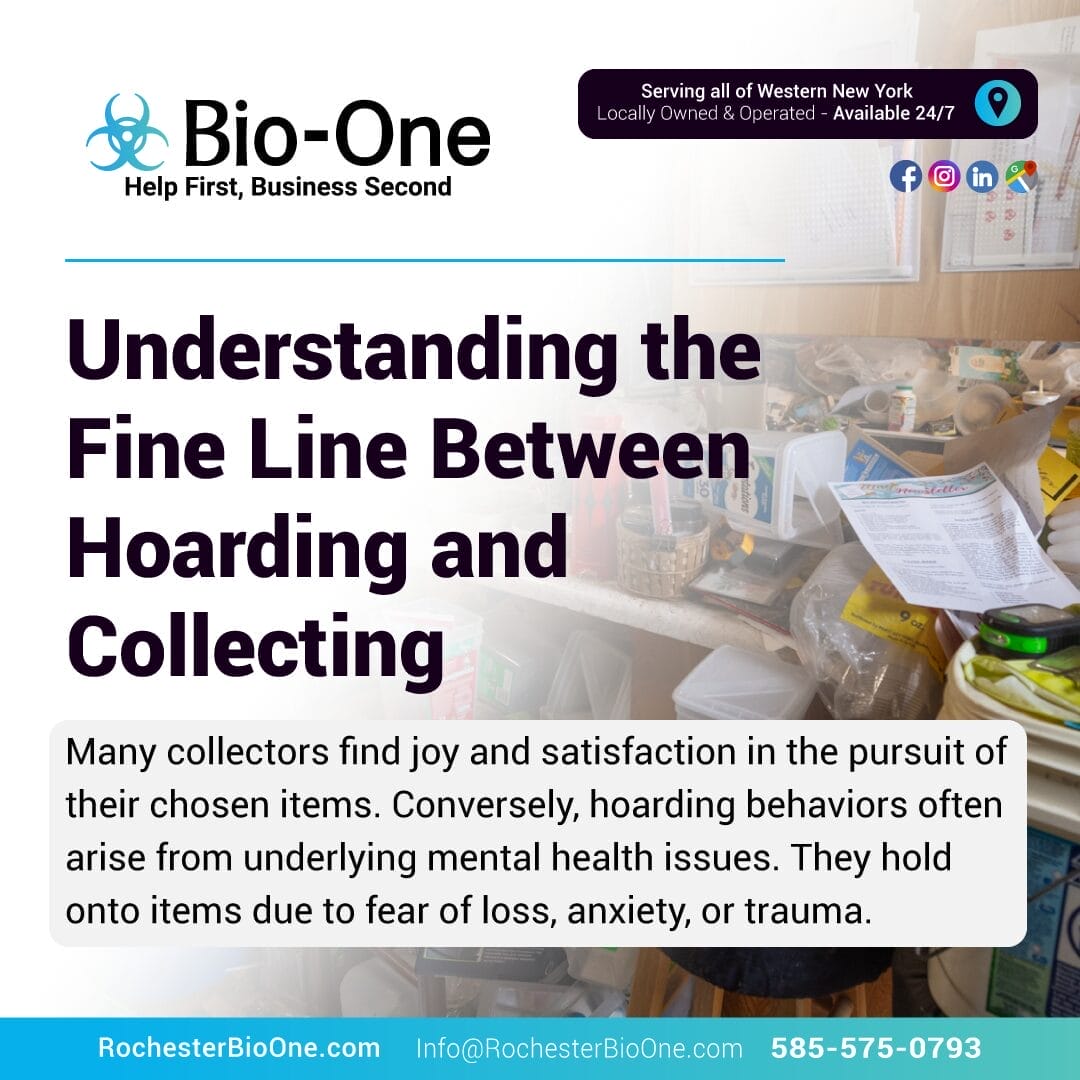
Have you ever wondered where collecting ends and hoarding begins? This line can often seem blurred, especially to those passionate about their treasures. In this blog post, we will unravel the differences between hoarding and collecting, explore the psychology behind these behaviors, and provide strategies for managing both.
Disclaimer
Please note that the information provided in this blog post is intended solely for educational purposes and to create awareness around hoarding. As a hoarding cleanup company, we bring expertise in managing clutter and restoring spaces, but we are not mental health professionals. We encourage readers facing challenges related to hoarding to seek assistance from qualified mental health professionals.
Hoarding refers to the excessive accumulation of items, often accompanied by an inability to discard them, regardless of their actual value. Collecting, on the other hand, involves intentionally gathering items with personal or financial significance. While both activities involve acquiring objects, they stem from different motivations and can lead to different outcomes.
The Psychology Behind Collecting and Hoarding
Collecting is driven by a variety of emotional and psychological motivations. Many collectors find joy and satisfaction in the pursuit of their chosen items. This process often represents a connection to history, culture, or personal identity. For instance, a stamp collector might revel in the historical significance and artistry of each piece. Collecting can be a form of self-expression, allowing individuals to showcase their interests and achievements.

Conversely, hoarding behaviors often arise from underlying mental health issues. People who hoard may feel compelled to hold onto items due to fear of loss, anxiety, or trauma. Unlike collectors, hoarders may struggle with decision-making and organization. Their possessions can become a source of stress and embarrassment rather than pride. Understanding these psychological differences is crucial for recognizing and addressing hoarding tendencies.
Recognizing Hoarding Behaviors
Identifying the signs and symptoms of hoarding is essential for those who may be struggling or for families seeking to support a loved one:
- Cluttered living spaces, making it difficult to move or use furniture
- Difficulty discarding items, even if they hold no practical value
- Persistent acquisition of new items without proper organization or disposal
- Emotional distress when faced with the idea of getting rid of possessions
- Social isolation due to shame and embarrassment about the state of their home
Hoarding impacts not only the individual but also their family and immediate environment. It can create tension and conflict within households, as family members might feel burdened by the chaos.
Understanding the Value of Collections
Collections can provide a sense of identity to those who cherish them. Whether it's a set of vintage toys, rare coins, or classic cars, collections often hold sentimental or historical value. They can serve as a bridge to the past, connecting collectors to memories, cultures, and narratives.
However, the line between a valuable collection and hoarding can be thin. Collectors should regularly assess the purpose and impact of their collections. Does the collection enhance their life, or has it become overwhelming? Maintaining this balance is key to ensuring that collections remain a source of joy rather than a burden.

How to Cope with Hoarding Situations
For individuals grappling with hoarding tendencies, there are many strategies to help regain control. Setting limits on acquisitions, organizing belongings, and prioritizing meaningful items are effective starting points. It's important to remember that change takes time, and gradual progress is better than none.
Nonetheless, seeking professional help is often the most effective way to address hoarding behaviors. Therapists specializing in cognitive-behavioral therapy can assist individuals in understanding the root causes of their hoarding and developing healthier habits. This might represent a significant improvement in mental well-being and overall quality of life.
Bio-One is Ready to Help.
If you or someone you know is struggling with hoarding behaviors, take the first step towards positive change. Share your story, seek support, and remember that you're not alone. Bio-One can help. We are a hoarding cleanup company, but our approach is much more compassionate and supportive than traditional cleaning services. Our team has the expertise and understanding to navigate hoarding situations with care, respect, and discretion.
Whether it's a small collection or an extreme hoarding situation, our goal is always to restore safety and dignity to your home. With Bio-One, you can trust that your possessions will be handled with sensitivity, while also ensuring a safe living environment!


